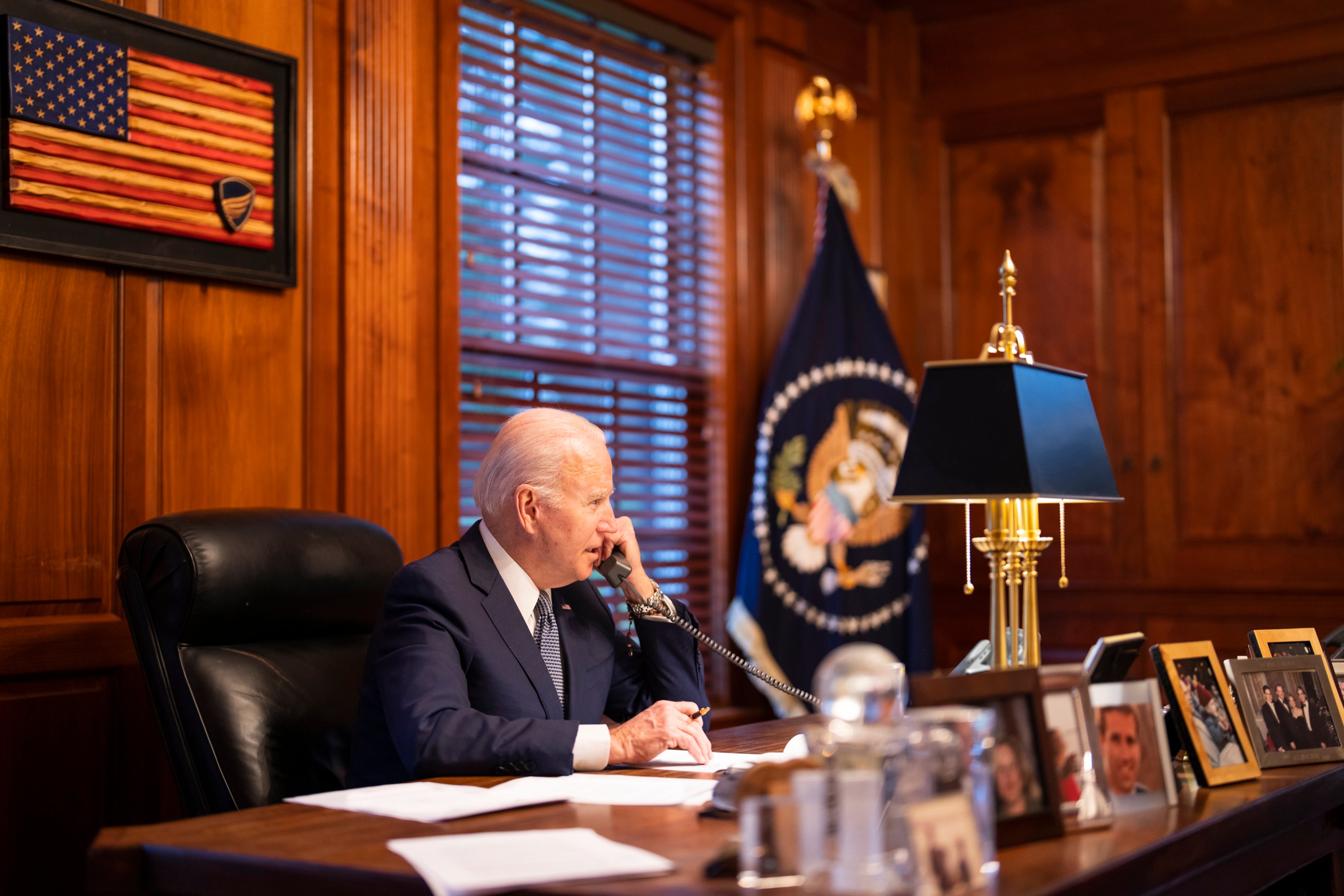Biden offers Putin choice of ‘de-escalation’ or ‘serious costs and consequences’ over Ukraine aggression
A White House official said the two leaders had a ‘serious, substantive conversation’

Joe Biden told Vladimir Putin that the US and its allies “will respond decisively” if Russian takes action to escalate its invasion of Ukraine.
The two leaders spoke for roughly 50 minutes on Thursday afternoon in a phone call convened at Mr Putin’s request. A senior administration official said the call appeared to be part of a series of engagements Mr Putin was making to mark the year’s end, but characterised the discussion as a “serious, substantive conversation” rather than one of year-end pleasantries.
According to the official, who briefed reporters on condition of anonymity, Mr Biden offered his counterpart a choice in how he proceeds ahead of a series of talks with the US and other countries’ representatives next month.
“President Biden laid out two paths – two aspects of the US approach that will really depend on Russia's actions in the period ahead,” the official said. “One is a path of diplomacy, leading toward a de-escalation of the situation and the other path is more focused on deterrence including serious costs and consequences should Russia choose to proceed with a further invasion of Ukraine.”
The official said the “consequences” Russia would face if Mr Putin chooses the latter path would take the form of “economic costs” and “adjustments and augmentations of Nato force posture in allied countries” including “additional assistance to Ukraine, to enable it to further defend itself and its territory”.
US and Russian officials are set to meet in several different venues beginning in January, including the US-Russia strategic stability dialogue on 9 and 10 January in Geneva, a meeting of the Nato-Russia Council on 12 January and a meeting of the Organisation for Security and Cooperation in Europe the next day.
The official said both Mr Biden and Mr Putin acknowledged that there will be areas where the US and Russia can find a way towards “meaningful process” and those in which agreements will not be possible, with both areas to be defined in the upcoming talks.
“That's what diplomacy is, that's what negotiations are for,” the official said.
They added that Mr Putin appeared to understand that the US would not be negotiating on the possibility of Ukraine joining Nato in the future or the status of Nato forces deployed along the alliance’s eastern flank in bilateral negotiations because of the US insistence on adhering to the principle of “nothing about you without you” requires that “conversations about issues that are of ultimate concern to our partners and allies” need to take place in “full consultation” with them.
In a statement, White House press secretary Jen Psaki said Mr Biden “reiterated that substantive progress in these dialogues can occur only in an environment of de-escalation rather than escalation”.
According to the senior White House official, secretary of state Antony Blinken spoke with Ukrainian president Volodmyr Zelensky prior to Mr Biden’s conversation with Mr Putin, and senior officials at the State Department, Defence Department and Treasury Department have been engaging in “extensive diplomacy” with US and Nato allies ahead of the US-Russia talks.
“Those conversations will continue to be the focus of US diplomacy over the course of next week ... in advance of the sequence of diplomatic meetings that will begin on January 9,” the official said.
They later added that the US will “continue to monitor” Russian troop movements “very closely” and prepare for whatever decision Mr Putin ultimately makes on whether to escalate in Ukraine, but stressed that the US would not be drawing any conclusions from what the Russian leader told Mr Biden during their conversation because he did not make any statements about his intentions.
The official also said the Biden administration would not be responding to public demands made by Mr Putin or other Russian officials in advance of the talks.
“Our focus is really on actions and on indicators, not on words at this point,” they said.
“Whatever the Russian side has decided is its best tactic and strategy in terms of its public pronouncements, we really believe – based on past precedents – that it is most constructive to have these conversations privately with our partners and allies, and with the Russian side.”
Join our commenting forum
Join thought-provoking conversations, follow other Independent readers and see their replies
Comments
Bookmark popover
Removed from bookmarks